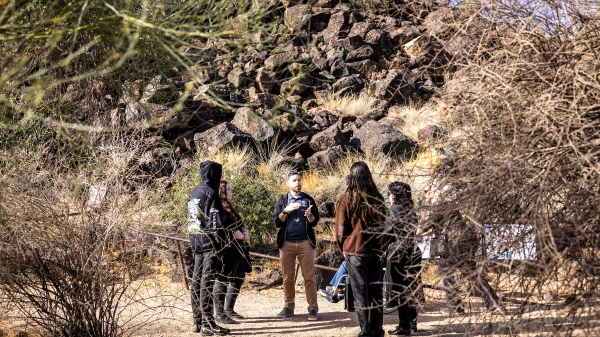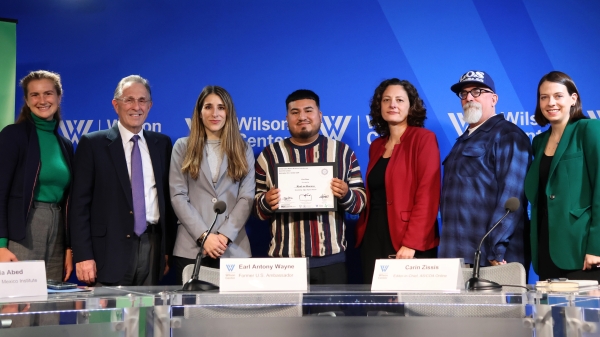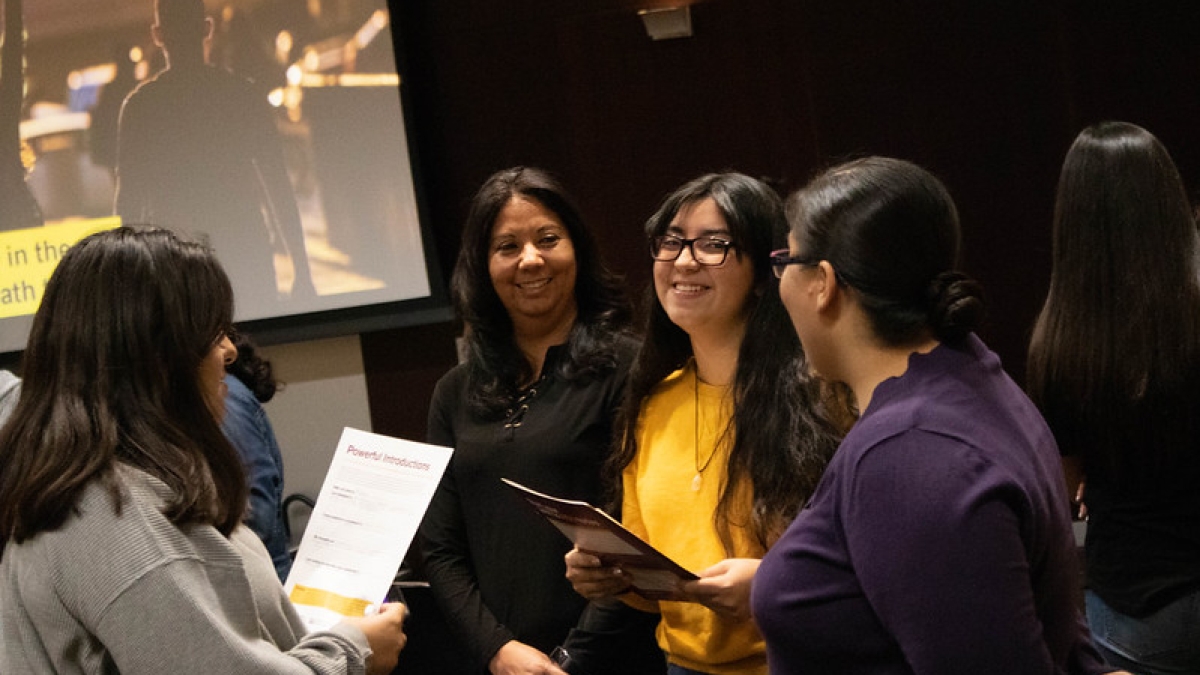Arizona State University and the Be A Leader Foundation have been awarded a grant to form a Network for School Improvement (NSI) to expand their existing school partnerships to build the K–12 pipeline and increase access to higher education for Arizona students. The $8.7 million grant will be funded by the Bill & Melinda Gates Foundation.
The grant award, announced Dec. 10, will launch the Arizona Network for School Improvement, which will leverage school district partnerships to improve educational outcomes and increase college enrollment among the districts’ most vulnerable students.
“For ASU, partnering with schools and communities is not an afterthought, but a fundamental component of our institutional design,” said ASU President Michael M. Crow.
“Through the Arizona NSI, our collaboration will scale our university-school district partnerships to drive innovation that enhances educational access and empowers learners to achieve their full potential,” Crow said. “We appreciate the support of the Bill & Melinda Gates Foundation.”
The project will focus on increasing college-going outcomes for the nearly 56,000 students within the Phoenix Union High School District, Tolleson Union High School District and Mesa Public Schools. The partnering districts will network with ASU, Be A Leader Foundation and each other to create, track and implement strategies to increase well-matched postsecondary enrollment.
“Every single child sitting in a seat today has the potential to enroll and thrive in a postsecondary institution," said Phoenix Union Superintendent Chad Gestson. "Potential is not enough, however. Many students today, especially first-generation youth and those from diverse backgrounds, also need expert guidance and sufficient resources to navigate the entire college application and matriculation process. This grant will enable Phoenix Union and our sister districts to dramatically increase support to thousands of deserving college-bound youth.”
In Arizona, 53% of high school graduates enroll in a postsecondary institution in their first semester after high school, but the number is significantly lower for underserved students. The 23 schools that will be networked through the new project represent 16% of all high school seniors in Arizona; in these districts, 75% of students are black or Latino, and 70% qualify for free or reduced lunch.
The project will convene school working groups and will use a continuous improvement model to test and revise ideas that will help increase postsecondary enrollment rates. The NSI will bring together K-12, postsecondary and community partners to support students with FAFSA completion and college advising designed to help more students pursue postsecondary enrollment at a school where students are well prepared academically to earn a degree.
Be A Leader President and CEO Melissa Trujillo said the method and model are important.
“While we know that no two schools are the same, there is a lot that schools can learn together and from each other to solve common challenges. Access ASU and Be A Leader will work together to provide our 23 schools with the tools, research and framework to not only identify and test promising solutions but — most importantly — to learn from each other,” she said.
“Having an infrastructure where schools can regularly share lessons learned and best practices will ensure more students are receiving the support they need to pursue higher education.”
The Network for School Improvement will build on work that Access ASU and Be A Leader have supported in each of these districts for the past 16 years — providing resources to build the K–12 pipeline and support access to higher education in Arizona. The project will leverage the relationships the two groups have built with educators and offer strategy development, professional development, data tracking, virtual and texting strategies for students, identification of students who need specialized advising and more.
Mesa Public Schools Superintendent Pete Lesar said that his school district is excited to continue working on educational access initiatives through the project.
“Mesa Public Schools is proud to partner with Arizona State University and the Be A Leader Foundation through this grant opportunity,” he said. “Working under the Network for School Improvement model will help many more of our students gain the supports they need to be college and career ready. We are grateful to the Bill & Melinda Gates Foundation for this opportunity to better serve our community's postsecondary transition needs.”
Tolleson Union Superintendent Nora Gutierrez said the project will have a huge impact on the students in her district west of Phoenix.
“I am ecstatic and excited for the opportunities that these funds will provide for our high school students. At TUHSD, we pride ourselves on preparing our students for college and careers based on outstanding academic achievement,” she said. “Our students are bright and exceptional, and they attend colleges and universities throughout Arizona and the nation. These dollars will go a long way toward supporting our students, and we are proud to be associated with both ASU and the Be a Leader Foundation.”
Sylvia Symonds, associate vice president with Educational Outreach and Student Services at ASU and principal investigator of the grant, said focusing on underrepresented populations will be significant in pursuing the Achieve60AZ goal (that by 2030, 60% of adults in the state will hold a degree or high-value credential) and also opening up educational and economic opportunities for Arizona families.
“The future of Arizona depends on students’ access to high-quality education as a pathway to opportunity,” said Symonds. “We know that the resources are out there: research, great ideas and educators who care deeply about student success. The Network for School Improvement takes those resources and leverages them to have a strategic, measurable and lasting impact on Valley communities.”
The Arizona NSI will be one of more than 30 networks across the country being funded by the Bill & Melinda Gates Foundation. Karla Robles, chief strategy officer with the Be A Leader Foundation and co-principal investigator of the grant, said being part of a national community of practice will allow the Arizona NSI to learn from other networks as well as shine a light on the great work taking place within our school districts.
The network will utilize evidence-based interventions and continuous, data-driven learning to improve student outcomes that are known predictors of high school graduation and postsecondary success and align with ASU’s commitment to the economic and social health of local communities.
The roadblocks that students face most often on the path to college are a known quantity, based on survey data and Access ASU staff’s observations over their years of work. Students report that not having enough money and not having enough information about the steps needed to go to college are primary obstacles. By providing FAFSA completion assistance, exposure to postsecondary pathways and establishing a college-going mindset, the Arizona NSI will support more students to achieve their higher education goals.
Yamile Martinez, a sophomore at ASU studying nonprofit leadership and management, knows firsthand how much inspiration can come from knowing that higher education is attainable. When she was a senior at Metro Tech High School in Phoenix Union, a friend who was a year ahead of her spoke on a panel about her experience with American Dream Academy and the Early Outreach Scholarship at ASU.
“No one in my family went into secondary education, so it was a big deal,” said Martinez, who went on to earn the EOS scholarship and several others. “Because if it wasn’t for my friend that night who was talking about her story ... I wouldn’t be here, and I wouldn’t be at ASU.”
Now Martinez is a SPARKS ambassador and shares her story with other first-generation college students and families all over the state, delivering information in Spanish and English. She wants to pursue higher education access work professionally after she graduates and said it’s important for students to have perspective about their end goal.
“For me to have a path that I can see the end of makes me so confident in what I’m doing,” she said.
More Arts, humanities and education

Petroglyph preserve celebrates 30th anniversary with ancient, modern tales
The Deer Valley Petroglyph Preserve provides a beautiful walk through a pristine desert where chuckwalla lizards are as plentiful…

Kaleidoscope short film contest inspires powerful binational filmmaking in its second year
“We come to this country not to steal anybody’s jobs but to take advantage of the opportunities that the rest ignore. We’ve been…

ASU's Neal Lester reflects on life, death of poet Nikki Giovanni
When Neal Lester heard on Monday that poet and activist Nikki Giovanni had died, the news hit hard.Lester, the founding director…
